Displaying items by tag: Peter Malone's Movie Reviews
My Favourite Cake
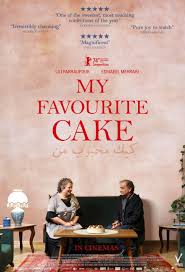
MY FAVOURITE CAKE/ Keyke mahboobe man
Iran, 2024, 97 minutes, Colour.
Lily Farhadpour, Esmaeel Mehrabi.
Directed by Maryam Moghadamm Behtash Sanaeeha.
For many decades, films from Iran have been prominent at film festivals in winning awards from Catholic and ecumenical juries. The country, often under world scrutiny and suspicion, international politics and often rigid imposition of Islamic law, has nevertheless produced a long line of films which dramatise human values, that can be appreciated worldwide.
And this is definitely the case here. The film was made in Teheran but the makers were not allowed by the government to travel to festivals to promote the film, seen to advantage in Berlin, 2024. And the film is, in many ways, critical of the law, interpretations, impositions by the morality police, especially as regards the status of women.
But, that said, this is a film which will appeal to a wide range of audiences around the world, especially female audiences. And, with the central character they did 70, a great appeal to older women.
We are introduced to a widow of 30 years, a former nurse, Mahin (a wonderfully sympathetic performance from Lily Farhadpour. Mahin is quite well off, lives alone, goes to the market, meets friendly people, cooks for a special meal for a group of old friends, women friends who gather to chat about the past but some concern about Mahin and her isolation. The women enjoy the chat, the provocation, comments about health, comments about socialising.
And the film is really about this kind of socialising, Mahin going to what used to be the Hyatt for morning tea, finding that it is now the Freedom hotel with a different style. She has coupons for a meal at a more moderate restaurant, listens to men chatting, notices an isolated elderly man hurrying through his meal. She listens to his comments to the other men, follows him out, sees that is a taxi driver…
The rest of the film is about the couple going to her home, each breaking out of their isolation, each with their own past story, some sharing of wine, some music, even dancing, food, conversation in the garden, and an increasing sense of attraction and intimacy. The two of them are more and more alive in a way that they have not been for years.
The elderly taxi driver, 70, Faramarz, is played by veteran Iranian he is a wonderful presence. Actor, Esmaeel Mehrabi. He is charismatic in his way but, one soon realises, that we are responding to him, not as an actor playing a role, but as the actual character, as if we were watching him in documentary reality.
Part of the conversation highlights the subordinate role of women in Iranian society, the strictness of the control by authorities.
However, audiences will be glad to have made the acquaintance of Mahin and Faramarz, to have shared their moments of happiness and, poignantly, moments of sadness.
- The focus on life in Iran during the Islamic Republic, the focus on women, middle-class ageing women, loneliness, companionship?
- The Iranian setting, the home and garden, the restaurants, the markets, taxi rides, sense of realism? The musical score and background? Persian songs?
- The story of Mahin, 70 years old, 30 years a widow, children overseas, her career as a nurse, retirement, the comfortable home, undocumented and likely to being taken by the government, the interiors, her garden and its importance? Her waking up in the morning, sleeping till noon, phone calls, going to the market, the taxi ride, the driver carrying her goods, her cooking?
- The reunion of the friends, their chatter, a focus on ageing, ailments and illnesses, focus on relationships and memories, Mahin presiding, enjoying the visit, the urging of her to make friends and go out?
- Phone calls with her daughter, images, the little boy and brushing his teeth, the daughter and her concern?
- Her going to the hotel, her pension cards, the change in the former Hyatt to Freedom? Her being outdated even on the drinks?
- At home, quiet, watching television, weeping at the television films?
- Iranian top directors and their many episodes in films of taxi rides, car rides, interiors, different angles? And the taxi rides in this film?
- The decision to go out, going to the restaurant, sitting at the table, the four men and their discussions, on going to protests? Seeing Faramarz’s sitting alone, eating, the taxi driver, comments to the men? Mahin watching him?
- His leaving, taxi driver, going to the headquarters, Mahin following him, the enquiries, waiting for him to return, the conversation, asking him to drive her home, his stopping for the medication, the rain? His willingness to visit, parking the car at a distance, her going in, make up, getting herself ready, change of address? The nosy neighbours, the visit of the woman who heard voices, Mahin making excuses?
- The character of Faramarz, his story, military service, not believing in the war, his pension, the brief set up of his marriage, the divorce, living alone, each day the same as the next? The attraction, he and her hopes?
- The process of the evening, the chat, the food, the wine, his drinking readily, her preparing the food, the herbs from the garden, his fixing the lights? The shower, sitting in their clothes? The aftermath, more conversation, sharing of memories? The music, Mahin dancing, Faramarz’s gradually dancing, the exuberance? The discussions about relationships, intimacy, sexuality?
- Faramarz, the drinking, effort, his going to lie down? Mahin discovering him, disbelief, his death? Waiting, washing him, covering him, the digging of the hole in the garden? Drag him out, the burial?
- The finale, the camera at Mahin’s back, the audience contemplating what it happened?
Your Monster
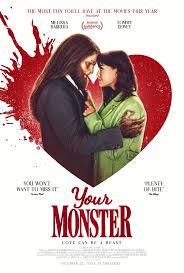
YOUR MONSTER
US, 2024, 103 minutes, Colour.
Melissa Barrera, Tommy Dewey, Edmund Donovan, Meghann Fahey, Kayla Foster.
Directed by Caroline Lindy.
There have been many variations on the theme of Beauty and the Beast, especially the classic fairytale and the different film versions, animated and live-action. But, the theme has been taken for all kinds of dramas, the male beast, the female beauty, the interactions.
This is a contemporary variation on the theme, the focus on a young woman, the beauty, Laura, Melissa Barrera, working with a composer to create songs for a musical production, but her being diagnosed with cancer, surgery, and the composer abandoning her.
The narrative has the background of the putting on a show on Broadway, the producers, money, intervening in the casting, the director, the writer, the various actors and dancers and their ambitions.
However, Laura is a recluse, one of the dancers a friend but whom she will discover has betrayed her. She does want to participate in the musical, even auditioning for a dancing role and being particularly unsuccessful at the audition. Yet she is hired as part of the ensemble.
But the key to the film, not a long running time, is Laura’s discovery of the other person who lives in her apartment, the Beast, human but hairy, a touch handsome, a touch more animal-like. He has a great influence on her, continued dialogue, his presence, sometimes absent, encouraging her, disappearing, but finally her going to a party, glamorously dressed, and his arrival there, well presented, and confronting the composer.
The film is particularly directed towards a younger audience, a younger female audience, identifying in many ways with the central character and her ambitions and her difficulties, but intrigued by the character and influence of the Beast.
But, there is the theme of the beast not just being external, but being part of the character of the young woman, the beauty and the beast in herself, the struggle, the creativity, the destructive aspects.
- The title? Her monster? expectations?
- The use of the Beauty and the Beast fable, Laura and her beauty, character? The Monster, his appearance, his behaviour, violent and vicious, yet charm within? The theme of the dual aspects of the one personality, beauty and beast?
- The opening, Laura in hospital, cancer surgery, her mood, the corridor, her memories, her relationship with Jack, the composing for the musical, his impatience in the hospital, leaving her, her desperation? Going home, the lonely apartment, Maisie as her friend, flighty, promising support?
- Laura at home, by herself, sad, eating, memories, hearing noises?
- The appearance of the Monster, his appearance, manner, his memories for Laura when she was a little girl, her trapping him in the room?
- No background for the Monster, but his presence, the vicious moments, the tormenting and teasing moments, his attitude towards Laura, her screaming?
- Their gradually getting used to each other, life at home, conversations, his understanding, his talents, his rendition of Shakespeare, his singing?
- The effect on Laura, her decision to go to the audition, to face Jack? The friendly young man and letting her in? Seeing Jackie Denman, her reputation? The audition, Laura’s failure, going home?
- Laura and the monster and their discussions, his encouraging her, getting her to scream, break the plates, break out? The interpretation of these actions as her inner monster surfacing challenging her?
- Her defiance, the interview with Jack, her being accepted as an understudy, part of the chorus, her presence, going to the rehearsals? Her watching Jack and his relationship with Jackie? Her envy, jealousy, feelings of revenge? Yet love?
- The Halloween party, the invitation to the Monster, his refusal, her dress, admired, watching Jack and Jackie, the rage rising? The Monster appearing, smartly dressed, the dancing?
- The confrontation with the Monster, his disappearance, her grief?
- The further rehearsals, the confrontation of Jack, bonding with the other members of the cast, Maisie and her betrayal with Jack?
- The performance, the first night, the audience, a powerful performance, her singing, her increased rage against Jack, blood smeared, the corpse on the stage floor, the finale, and beast taking over the beauty?
Twas the Text Before Christmas
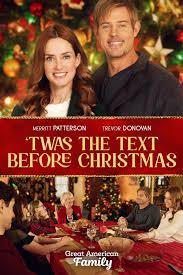
TWAS THE TEXT BEFORE CHRISTMAS
US, 2023, 83 minutes, Colour.
Merritt Patterson, Trevor Donovan, Jayne Eastwood, Eric Peterson, Rob Stewart.
Directed by TJ Peacocke.
The title plays on the famous Twas The Night Before Christmas. A social media variation – where the leading lady, Addie, Merritt Patterson, a chiropractor in New York City, receives a mistaken text from a grandmother in Vermont, Nana. But, that\ey begin talking, friendship, and Addie going to Vermont for Christmas.
This is one of the many popular films for television with Christmas themes – and they are there in abundance. This film has the distinction of being G rated and so available without reserve to the widest audience.
It is all very familiar material with the variation on the texting. Those who make continual pleas for original material, not for them. For those who enjoy the conventions and the variations, the atmosphere of Christmas celebrations, romance, younger generations, older generations, this is the kind of film that is popular.
There are the romance themes, Adie and her being left by her longtime boyfriend and his getting engaged quickly, her friendship with Traci, fellow chiropractor, happily married, holidaying in Florida, always inviting Addie. The complication is that her mother has died, her brother works in Australia, her father, genial, spends one Christmas in Australia and the next with Addie in New York. Complications in Australia, and he accepting the invitation to Vermont, her going to Vermont and meeting the family, especially James, Trevor Donovan, who is a doctor in service throughout the year in South America.
Lots of family cheer, a very delayed romance and no really explicit acknowledgement of it until the last five minutes! But Nana, the grandmother, a bright Jayne Eastwood, is attracted to the widower who runs the local bed-and-breakfast.
While we can see what is coming all the time, the enjoyment is the looking forward to it and seeing how it all works out.
Very American Christmas, some carols in the background, the generic grace before meals, not a religious Christmas but a very humane one.
10 Days of a Curious Man
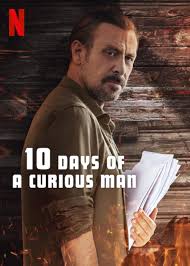
10 DAYS OF A CURIOUS MAN
Turkey, 2024, 110 minutes, Colour.
Nejat Isler.
Directed by Uluç Bayraktar.
This is the third film in a trilogy of Turkish crime investigation tales. It follows 10 Days of a Good Man, 10 Days of a Bad Man. And many of the cast appear in the three films.
The focus is on Sadik, seen investigating crimes of the previous films, his writing a novel, the manuscript rejected, his reaction and further investigations.
There are all kinds of complications in the city, burning buildings, rebuilding, zoning and forests, political corruption, personal corruption, intrigues in relationships.
Sadik and his associates see themselves as the equivalent of the police, vigilante imposers of the law, including executions.
This film, of course, presupposes audience knowledge of the previous films and the characters and response to them – it could stand alone but it does presuppose a great deal.
But, for the fans of the previous films, popular entertainment.
- The third in the trilogy? Popularity? Turkish audiences? Universal audiences?
- Audience liking of the first two films, the central character, personality, writer, investigator, vigilantism? His associates, his team and his control of them? The women, relationships?
- Murder mystery, complications, twists, investigation?
- Introducing Sadik again, his manuscript, the rejection, his reaction, coming out, the cats, the woman feeding the cats, the old lady, her nephew, the dog, his being photographed?
- The setting, the car, the robbery, hiding, the chase?
- Sadik, the women from the past, relationships, Pinar, this association her life, career, the text and photos, coming to him, the older woman and her drinking, finances, television hopes? Calling his team, their personalities, tough, comic?
- The background of the mystery, finances and officials, corruption, buildings and zonings, the burning down of old buildings, clubs, dancers, the sex dimension, exploitation?
- The mystery of the young woman, feeding the cats, her apartment, her dancing, her name, the videos, the costumes, the disappearance? Her link with the young man, his selling the bottled water? Their hopes?
- Her being missing for 14 days, Sadik and his curiosity, inquiries, opening up the range of crimes and criminals?
- The range of villains, the agent, good reputation, his wife and her amorous liaisons, the revelation of the nephew, the gun, the shootings and deaths? The revelation of the setup and her going to Sadik’s house, drinking with the woman, the compromising photos, the police suspicion?
- The bosses, the sexual encounters, the clubs, the brutality? Sadik and his confrontation with the boss, the interrogation, shooting him?
- Tracking down the wealthy businessmen, Pinar and her leads, her growing involvement, the meetings, the set-ups?
- The businessman, his affair, abducting the woman, the interrogation, the man in the pool, relaxing, Sadik and the crew, the interrogation, shooting him?
- The tracking down of the nephew, his cough mistaken for a laugh, the dancer, his blackmailing, the money, the apartment, the trick with the two apartments connected, Sadik using his phone, giving his crew the instructions, their overcoming the villains, setting the fire?
- The finding of the dead body in the bath, the assault, Sadik killing the killer?
- The happy ending, Sadik vindicating his capacity for investigation, writing, detection? And the proposed marriage and the benefits for Pinar and her progress?
- The popularity of the trilogy?
Heretic
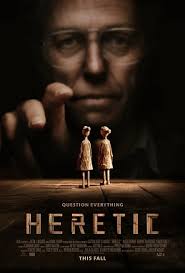
HERETIC
US, 2024, 111 minutes, Colour.
Hugh Grant, Sophie Thatcher, Chloe East, Topher Grace.
Directed by Scott Beck, Bryan Woods.
An arresting title. Heresy – but heresy from what faith?
It is not easy to categorise this thriller. On the one hand, there will be an audience who wants to see it as a horror film, an insane male character terrorising two young women, confining them in his house, continued threats, violence. And, this audience will be aware that there is a lot of religious discussion during the film but they will not find this very interesting, hearing it but not particularly taking note of it. The thriller tension is what is important.
On the other hand, there will be an audience who listens attentively to all the dialogue, the focus on churches, on religion itself, unbelief and its consequences – all presented in the context of a thriller of menace and ultimate violence.
And, this thriller is particularly different because of the presence of Hugh Grant. He has played some villains in recent films and television series but here he returns to the style that he used in so many of his romantic comedies. There are his sometimes stumbling manner, his ironic grimaces and self-deprecation, his immediate charm. But, as the narrative goes on, this becomes a very sinister charm.
One of the arresting aspects of the film is that it initially focuses on the Church of Latter Day Saints, the Mormons. (In fact, film information notes that the two actresses were brought up as Mormons, though no longer belonging to the church, and so know from the inside how they should play their roles.) They are young, earnest, chatting together initially about personal attitudes, one finding that watching a pornographic film confirms her belief in God, the of the more wary. And, they are ignored in the town as they offer leaflets, mocked by a group of girls wanting a self it with them.
But, their appointment is with Mr Reed who has told the church he is interested in Mormon beliefs. And so, Hugh Grant, Mr Reed, charming and welcoming, the girls cautious because they need to have another woman in the room with them, Mr Reed promising his wife in the kitchen, making blueberry pie, will join them. Of course, she does not. And, while he has trapped the girls, he continues with his conversation, asking them about their faith, talking about his religious investigations, studies and essays, all the time reassuring them even though they become more and more anxious, pretending to ring the church for rescue.
So, interest in the film will depend on how much audiences want to see as the menace continues, the consequences for the young women, trapped, wanting to escape, and, indeed, going down to the basement and discovering another weirdly sinister world. And the young women using their wits in desperate situations.
Those following the dialogue will be both enlightened and confused as it develops, Mr Reed using songs like The Air I Breathe and board games like Monopoly and the changes with further “iterations” as illustrations of how original experiences of faith lose their strength and power with further iterations. And he does come up with a solution, even as he horrifies the women and ourselves as we discover his secret and weird belief in raising women “prophets” from the dead. Control is his final answer, all the nature and core of all religion being control.
Audiences were not quite expecting this one!
1. Title, religious themes?
2. Orthodoxy and heterodoxy?
3. The Church of Latter Day Saints context, as a church, Joseph Smith and his testing religions, forming his own, his personal life, issue of polygamy, changing laws, evangelisation, sisters and brothers going out to visit, the Church authorities?
- The film as a psychological thriller, as a religious/religion-oriented thriller?
- The presence of Hugh Grant, his reputation, his acting style, his charm and idiosyncrasies, grimaces, eyebrows… Used to different advantage here?
- The plausibility of the plot, the church, the missionaries, their behaviour? Mr Reed and his house, his initial manner, the deception, the control, the discussions about the true religion, God, the trapping of the women in the house, the issue of raising from the dead, the revelation of the truth, Mr Reed and his believe in that true religion is control?
- The introduction to the two missionaries, the huge mountain, the seat, chat, the discussion about pornography, and the reinforcement faith? Sister Barnes and her reaction? Moving through the town, ignored by people, the girls with the photo and pulling sister Paxton’s skirt, climbing the steps, returning, the bikes, going to the Reed house, the appointment?
- Hugh Grant as Mr Reed, the welcome, the sympathy about Mormonism, the offering pie, the promise to meet his wife, her shyness, the drink, the candles? Taking their coats? The revelation about locking the bikes, the key in the wrong pocket? The beginning of the uneasiness?
- The thriller aspect, the women trapped, time passing, the pretence about phone calls, yet his saying that there was metal in the walls, no phone, the mechanism for locking the door? The possibly leaving at the back, the house built on the cliff, the two doors, belief in disbelief, his taunting them, the going down into the basement, the consequences in the basement, the apparition of the old woman, eating the pie, her death, the plan for her resuscitation? The desperation of the young women, the device of trying to get the matches?
- The theological aspect, audience interest in Mormonism, its history, Joseph Smith, his own behaviour, the comments about polygamy and the changing of the law, polygamy for promoting more children in the church? The further conversations about the different churches, about God, about belief, the testing of the girls? Mr Reed and his explanations about his study, the range of books on his library, his essays, his explorations, his playing of the music, The Air I Breathe, and his theory of iterations, from the original through the various developments, moving away from the original insight? The example of Monopoly on the boardgames in the developments?
- In the basement, Sister Paxton attacking Reed, his slashing Sister Barnes, her bleeding out, her coming again, bashing Mr Reed? Sister Paxton, the confrontation of ideas with Reed, her astuteness in noticing things, her escape, through the various doors, the discovery of the women in cages, his controlling them? Her shrewdness in noting what had happened, the conclusion of religion was Control? His agreement, the attack by Sister Barnes, her death? Sister Paxton and her working out that his control was to make them think that they were in control while he controlled them?
- The background of the elder, in the church, checking on the girls and their return to headquarters, his going to visit Mr Reed, his return with the pamphlet?
- The uncertain ending, the effect on Sister Paxton, Reed and his beliefs, control, his Satan -like theories?
Joy/ 2024
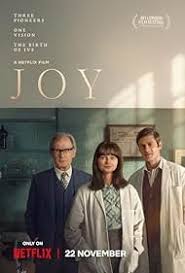
JOY
UK, 2024, 115 minutes, Colour.
Thomasin McKenzie, James Norton, Bill Nighy, Rish Shah, Tanya Moodie, Joanna Scanlon.
Directed by Ben Taylor.
The 21st century audience takes IVF procedures for granted. It was not always the case as this film dramatises.
This is an interesting and enjoyable drama, fairly straightforward in its presentation. It opens in 1968, the year in which the central characters started to work together towards success in IVF procedures, the naming of particular years on the screen, until 1977 and success with the pregnancy and in 1978, the birth of the first baby, Louise Brown, in England.
The is one follows the science steps of those involved, insights, experiments, many failures, and some scepticism from the science community. The film also follows the scientists and surgery working with a range of infertile women, full of hope that they will be able to conceive and give birth. And, the screenplay gives a great deal of attention to ethical issues, criticisms, the accusation of interfering with nature, fears of the consequences in health for the children born.
At the opening of the film, there is a tribute to the three people key to the development of IVF and the comment that one of them, a young woman at the time, a trained nurse with an interest in science, Jean Purdy, who had died at age 39 from cancer, had not been included in the plaques or tributes. And the surgeon who was key to the processes, Patrick Steptoe, had also died. The survivor, named as a Nobel prizewinner Robert Edwards, is honoured but makes an appeal for recognition of the other two.
With this introduction, we see the young Jean Purdy (New Zealand actress, Thomasin McKenzie) eager to meet the creative scientist, Bob Edwards (James Norton), successful in catching a runaway mouse in the lab, immediately getting a job. They go to hear the surgeon, Patrick Steptoe, played by Bill Nighy in one of his most agreeably positive roles, in dispute with other scientists, noting some of his surgical breakthroughs.
The action taking place over a decade, we see the young woman moving from her 20s to 30s, deeply involved, her religious mother disagreeing with her, not wanting her to visit her or the church, a sacrifice for the religiously-minded Jean. The quality Jean brings to the procedure is the personal interaction with the women, not just the science and the medicine, but the personal, emotional, the psychological – the first group of women calling themselves the Ovum Club.
James Norton is intense as Edwards, a family man with several daughters, aggressive, especially in a range of television interviews where he is challenged, his procedures are denounced, his becoming despondent, deciding to stand for politics but not being elected, persuaded by Jean to go back to the enterprise.
Patrick Steptoe offers the medical contribution, the precise and typical procedures for the impregnation, number of attempts, having to communicate failure to the hopeful would-be mothers, supported by his wife over the years.
The last part of the film is the encounter with the Browns, the success, the pregnancy, the caesarean birth, the joy of the parents, the happiness of the trio – and the Browns offering them to suggest the middle name for their daughter, the group suggesting Joy.
- Audience knowledge of the development of IVF, the 1960s and 1970s, science, ethics, media, religion, public opinion?
- The title, the joy of women giving birth, the team’s name for the middle name for Louise Brown?
- Based on a true story, the opening speech, Robert Edwards and his point that Jean Purdy had been ignored, his plea for acknowledgement for her? For Patrick Steptoe? The visualising of the plaque at the hospital?
- Introduction to Robert Edwards, his scientific background, the beginnings of IVF, his laboratory work, his team, his interest in Patrick Steptoe, at the lecture, Steptoe and his interrupting the speaker, his irritation? Indications of clashes between scientists and their subjects, possibilities, ethical issues?
- Jean, her age, her background work as a nurse, science, her interest in Bob Edwards, coming to the office, wet shoes, holes, the chasing of the mouse, catching it, being hired?
- Jean, her personality, religious, church, the Vicar? Her mother, devout? Her mother correcting her, not stooping…? The mother’s response to her daughter’s work, public opinion, wanting her to give it up, not going to the church, not coming to the home, the pain for Jean, the loss of religious comfort in the church, the separation from her mother, the later visit to the church, with the vicar? The hostile helper? Leaving the treat for her mother at the door?
- Bob Edwards, his intensity, at home, his wife, his daughters, home life? The discussions? His continued investigations, persuading Patrick Steptoe, Steptoe and his techniques, laparoscopy, assisted by Marian, Matron, Jean’s shock to discover he was doing abortions? Matron’s explanation of backyard abortions, women’s choice?
- The highlighting of dates, from 1968, various moves to 1977, the stages of experiments, the scientific explanations given, the close-ups of the work, confidence, the group of women, arriving, talking, tests, the procedures,, disappointments, audience sympathy for the women? The calling themselves the Oval Club? Jean and her personal listening, the outing to the beach?
- The effect of all this work over the years on Jean? Her looking sad, often morose? The interactions with Patrick, especially concerning her illness and the possibility of having children? The interactions with Bob, the enthusiasms, the disappointments, fresh ideas and possibilities?
- Her leaving, going back to her mother, caring for her mother, her mother’s death? The funeral, Patrick and his wife coming?
- The continued interest, ideas, the contact with Bob, his standing for the Labor Party, his defeat? The group getting together again?
- The new group of women? Moving to 1977?
- Bob, direct, the media, trying to avoid journalists, television interviews, the discussion with the scientist and his development of DNA? The public hostility in the television audience? Scientists and their condemnations? Ethical issues? His arguments in the developments in contact lenses, false teeth…? And the risks of failure?
- The buildup to the first success, Leslie Brown and her husband, an ordinary couple, their consent, the details of the IVF work, her pregnancy, the caesarean birth, the first IVF baby, her father, the joy of the team, the process being filmed, the photos? The decision to offer the name Joy for the baby?
- The importance for audiences to see this story, the human issues in the context for scientific development, ethical issues, decisions? The final information about the statistics of babies born through IVF?
The Lord of the Rings: the War of the Rohirrim
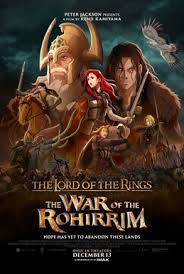
THE LORD OF THE RINGS. THE WAR OF THE ROHIRRIM
New Zealand, US, Japan, 2024, 134 minutes, Colour.
Voices of: Brian Cox, Gaia Wise, Miranda Otto, Luca Pasquarello, Lorraine Ashbourne, Shaun Dooley, Laurence Ubong Williams, Michael Wildman, Billy Boyd, Dominic Monaghan.
Directed by Kenji Kamiyama.
This is a pre-Hobbit tale, 183 years before the story of the rings. The characters and places are taken from appendices to J.R.R.Tolkien’s sagas. However, one character has been invented for this film, a young, vigorous, heroic princess, Hera, with the narrator telling us that none of the stories told about her survived. A license then for the screenwriters to be creative.
The immediate striking aspect of the film is that it is an animation saga. The director is Japanese, Kenji Kamiyama, with much experience in Japanese Anime. So, on the one hand, this is very much anime style of storytelling and action, particularly characteristic, the minimal mouth movement of the characters as they speak. But, on the other hand, the influence of Peter Jackson’s films, backgrounds, castles, warfare, is still very important. And, the style of animation, building on the live performance of the actors.
It is surprising to learn that the film has not been a box office success. One would have thought that there is a continual succession of generations fascinated by Middle Earth, its characters, the conflicts, the magic.
For audiences able to accept this anime style and an animated version of the stories, it is very enjoyable in its way. It is a very masculine world, a mighty king, voiced by Brian Cox, his prince sons, his Rio prince nephew, his Armed Forces, and a conflict with a rival lord, a sudden death, the Lord’s son consumed with vengeance, unrelenting, attacking the castle, laying siege, a bitter winter, unwilling to take advice to raise the siege.
But, we have been alerted straightaway to Hera, another embodiment of the development of the Disney princesses, the Warrior Princess, doted on by her father, protected by him, but learning to take stronger and stronger stances, eventually confronting the angry vengeful besieger of the castle, and hand-to-hand combat.
At the end, there are some links to the future Rings stories, the image of Christopher Lee’s Saruman (and his actual voice, a clip from one of the films, reminding us of his evil power). Billy Boyd and Dominic Monaghan from the originals are also in the voice cast and, interestingly, Hera’s devotedly strong-minded maid is voiced by Lorraine Ashbourne (who, in fact, is the wife of Andy Serkis, Gollum).
Plenty of action, plenty of colour, memories of Howard Shore’s rousing score, a venture into a different kind of Middle Earth.
- The popularity of Tolkien’s books? Tales and imagination? Fantasy? Heroes? The popularity of the films? Peter Jackson, the adaptations, producer of this film? Philippa Boyens and her writing the screenplays?
- The decision for an animation film? The Japanese , the directors, Anime style, formal, strong characters, the importance of the layouts and backgrounds, musical score (and the echoes of Howard Shore’s original score)? The animation style fitting the Tolkien world, Middle Earth, the delineation of each of the characters, costume design, the backgrounds, the action sequences, the battles and hand-to-hand fight?
- The background of the characters and places in Tolkien’s appendices? The invention of Hera? The voice-over, the explanation of her character, the fact that her stories were not recorded? Free opportunity for the screenwriters?
- The introduction to Hera, age, background, her father and younger brothers, skilled in riding the horse, and action in vigorous heroine?
- The kingdom, the King, his appearance, strength, leadership, the sudden appearance of his rival, the confrontation, the one-to-one fight, the fatal blow, the reaction of the son, vengeance, consumed? And his past relationship with Hera in their childhood, his proposal, her rejection?
- The title, the war, Wulf and his vengeance, the importance of his assistant and advice? Laying siege to the Castle, his forces, the long winter, the effect on the troops, on those trapped in the Castle? His adviser suggesting he withdraw, his refusal, ultimately killing him?
- Hera, the situation with the Eagles, the offering of the food, their power, her later returning, the request, their understanding the language, the helmet, the Eagle flying to urge her cousin to come and fight?
- The situation in the Castle, the King, his blaming himself, protecting his daughter, going out, the fight and confrontation, his surviving, his single-handed warding off the enemy? The reconciliation with Hera? His watching from the battlements, Wulf and the death of his son, the hostage, cutting his throat?
- Hera, her maid, tough-minded, her son, his role in the Castle, the proclamations?
- Hera, the decisions about the escape, the inhabitants rounded up, the young boy, leadership, escaping the castle?
- Hera, her cousin and his forces coming, the siege, the fortification pressed against the castle wall, the attack, the opening of the gates, their seizing, the king remaining outside?
- Hera, her plan, with her maid, writing to confront Wulf, the combat, his attack, wounding her, her killing him?
- Order restored, but Hera wanting to be free and go her own way?
- The links with The Lord of the Rings, Suraman’s appearance, the Orcs and their stealing, 183 years before the Rings?
Under Streetlights
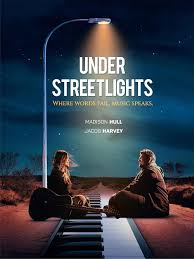
UNDER STREETLIGHTS
Australia, 2024, 90 minutes, Colour.
Madison Hull, Jacob Harvey, Leighton Mason, Luke Scholes, Lachlin Blue, Lynette Ellis, Ian Martin, Declan Castle.
Directed by Danielle Loy.
The first streetlights of the title are in Alice Springs. In fact, this is very much an Alice Springs film.
We see many aspects of the city, the different neighbourhoods, the home of the white policeman, the home of an aboriginal family, shops and bars, schools, the city streets. And we see the surrounding country, especially at the end, a journey from Alice Springs towards Melbourne.
In most ways, this is a gentle and hopeful film. It should be noted that this is the first film for the six main characters, and they are quite convincing. First there is Ella, played by Madison Hull, a teenager grieving the death of her beloved mother in a car accident. Her father, Jack, Luke , Scholes doesn’t cope, drinking. By chance, Ella comes across Izac, Jacob Harvey, young aboriginal man, lover of rap, composing songs, using his computer for background music. They become friends.
And we see Izak at home, his younger brother Tobias, his father, Clifford, glimpses of’ Clifford’s background as an international dancer, touring France, at the Eiffel Tower, now an alcoholic. And, at home, there is the idle Uncle Ronnie, Ian Martin, who sits and makes sarcastic comments. And there is Aunty Samara, Lynette Ellis, very sympathetic, always advising Uncle Ronnie to shut up.
Which means that this is a pleasing film about friendship, love of music, composing songs, sharing, and genuine bonding. But, this is Alice Springs, and the realities of racism and, especially, alcoholism, have to be faced. Jack, in fact, is a police officer who had raided Clifford’s house in the past, treating the family harshly. And, it is a shock to Jack to find his daughter at Clifford’s house. Tensions rise, Izak and Tobias, leaving home, their father and uncle taking their money. And, Ella more and more alienated from her father.
The story becomes something of a message film at the end, the younger generation running away, hopes to make success of their music in Melbourne despite so many previous frustrations, the two fathers in pursuit to rescue their children. A message of reconciliation – and, exuberant hope as the two youngsters with their band perform successfully at a club.
A short and modest film, some familiar material, but engagingly presented.
- The title, and the song and its background, Alice Springs, the wider world?
- An Alice Springs story, a symbolic Australian story, the indigenous community and their situation, the white community, interactions, prejudice, suspicions and injustices?
- A contemporary music story, the young musicians, composers, writing, rap, computers, studios and recordings, promotion and projections, concerts and success?
- Ella and her story, the opening, the death of her mother, the accident, her bonding with her mother, the music, her father and his sadness, policeman, drinking? Ella managing, at school, her friends?
- Ella and her accidentally hearing Izak, the music, the rap, with his friend Chase, outside the club? The conversation, Ella and her curiosity, tracking Izak down, visiting the house, the discussions about music, her response, her own music, sharing, meeting his family? Her explanation of her origins, Irish, Central America and indigenous? The Irish and indigenous in common?
- Izak, the house, in Alice Springs, his father, drinking, the flashbacks to the past, his skill in dancing, in front of the Eiffel Tower, his drunken dances at home? Uncle Ronnie, idle, comments, wanting the money? Aunty, the wise member of the family, kindly, her comments, telling Ronnie to shut up so often? Life in the house? Izak and his younger brother, Tobias?
- Ella and her father, his continued drinking, the risk to his job? Memories of his wife? Ella and her room, her music?
- Her father, finding her at Izak’s house, the past history, the animosity, the hostility? The consequences for Izak and for Ella?
- The separation, the phones, the contact, Izak’s work at the bar, friendship with Chase, the music, using his computer, his band, saving the money, yet the family stealing it, the support of the manager of the studio, the recording, the joy? Sending out the links, the responses from the companies? Disappointment?
- The buildup of tensions, Ella with her father, the clashes, long drinking bouts, the police concerned? Her decision to leave home, to go with Izak to Melbourne, to sing?
- The final confrontation at home, Izak strong about his father, the family and the money, the drinking, leaving home with Tobias, supported by Chase?
- Ella and her mother’s car, her father’s refusal, leaving, with Izak and Tobias, her driving, journey towards Melbourne, the countryside, the water, venturing through, the breakdown?
- The two fathers, the meeting, the discussions, driving together, finding the young people, the reconciliation?
- A month later, the concert in Melbourne, the fulfilment of his extremes, the singing, the crowd, the applause – and a future?
Hors-Saison/ Out of Season
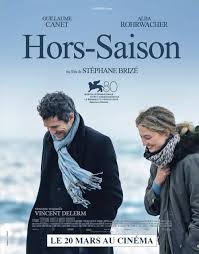
HORS- SAISON/ OUT OF SEASON
France, 2023, 115 minutes, Colour.
Guillaume Canet, Alba Rohrwacher, Sharif Andoura, Marre Drucker. Lucette Beudin, Hugo Dillon, Staphane Brize, Johnny Rasse, Jean Boucault.
Directed by Stephane Brize.
Pensive. Unhurried. Melancholic. Tres français. Vraiment.
Winter, hors-saison, a coastal French town where huge waves break on the rocks, or stream onto the vast beach whether anyone is there or not.
We follow a car to a modern luxury hotel, where Matthieu, a popular film star (and Guillaume Canet playing Matthieu is definitely that in fact). He has walked out on rehearsals for his stage debut, afraid, checking with his busy TV executive wife, getting the benefit of comfort, massage, therapy – although some comic scenes with the talkative,-theoretical Jim trainer and in his room where he finds it very difficult to cope with the technology, especially a recalcitrant and unstoppable coffeemaker.
Then a contact from the past. Alice (an excellent Alba Rohrwacher) with a more than five minutes restaurant conversation with Matthieu. The film becomes more about her and there is much more depth, more regrets as her life, marriage, motherhood, life in the town over 15 years is revealed. And the former relationship in the grim breakup, his abruptly leaving her.
This is a film of conversations, a number of restaurants, exploring the past. Alice reveals her home life, the audience getting a glimpse, especially of her hurt, her relationship with her daughter, love, truth, her talent with the piano, composition, teaching, but regrets…
Alice has friends in an aged care home and there is a strong sequence (though not necessarily key to the plot), an interview with an elderly woman about herself, marriage her relationship. At the celebration, enthusiastic song, dance, and a fascinating routine, enjoyably long, that most of us have never seen before, one reviewer referring them to as bird singers, another as “avian impersonators”. The couple really do have a talent for imitating the birds and dramatising the variety of their actions. One of the cinema moments when you feel the urge to join the applause as they take their bows.
The interaction between Matthieu and Alice lingers on, complex, a time for Matthieu leave, or not, Alice to keep on with her life no matter what. A wounding one-sided breakup has to give way to an amicable parting.
- The title? The atmosphere of the winter town on the Brittany coast? The quiet, the bleakness, the weather? The ocean pounding on the rocks? The water coming in to the empty beach? The musical score?
- The introduction to Matthieu, the car, the aerial shots of the road, the countryside, the car, his coming into the town, the hotel, the spa, the accommodation, his treatment, his room, the comedy with the recalcitrant coffeemaker, his idly opening and shutting the doors, the discussion with the theoretical gym trainer, the massage and its effect? The background of his marriage, the phone call to his wife, the television station, her efficiency as a manager? His attempt at theatre, overwhelmed, walking out, the phone call from the producer reprimanding him? Yet his great career as a movie star and people recognising him, photos and autographs?
- The surprise phone call from Alice, her coming to meet him g, her personality, the revelation of the relationship 15 years earlier, his abruptly breaking the relationship? Stranding her, her coming to the town, marrying the doctor, the 15-year-old daughter, her own music compositions, teaching piano lessons?
- The discussions between the two, the long conversation at the restaurant, re-acquaintance, getting to understand each other, the effect on each of them, the memories? The continuing to meet, to discuss? Seeing Alice, at home, with her husband, friends, discussion about issues in the town, with her daughter?
- The visit to Matthieu, the sexual encounter and the consequences? Not to meet again?
- The interlude with the celebration of the marriage, the long interview with the older woman, extraneous in many ways to the action of the story, yet her explanation, her family, age, relationship, love, the celebration of the union?
- The party, the bird imitators, their performance, entertaining?
- The music, the dancing?
- The various stages of ending, Matthieu staying an extra day and the consequences, Alice and her visits, to leave or to stay? The break up of the past, its savage effect, the comparison with the reconciliation and an amicable parting?
Welcome to Yiddishland
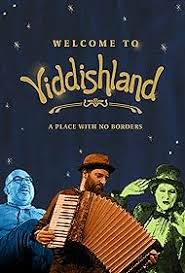
WELCOME TO YIDDISHLAND
Australia, 2024, 95 minutes, Colour.
Directed by Ros Horin.
2023-2024, especially with the Middle East conflicts, particularly Israel and Hamas, there is a greater need for social cohesion, and this has become significant in Australia, protests, signs and flags, the burning of the synagogue… And the official government appointment of mediators for anti-Semitism and he and anti-Islam.
One of the ways for this social cohesion is appreciation of the different cultures, their traditions, sharing in music, sharing enjoy.
And, this is what this film is trying to do. Especially with its provocative title and the reference to Yiddish. Which means that a non-Jewish audience has to check on what they know of the Yiddish language, a game of the Tongue. Many, and culture, used in Europe for 1000 years, during times of prosperity but, especially, times of oppression and persecution. (Maybe not an exact parallel but those of Irish extraction might remember the role of Gaelic in oppressed Ireland for so many centuries.)
Surprisingly, this is an Australian production, interviews with local actors, singers, composers, theatre directors, some will like Evelyn Krape and enjoyable reminiscences from Barry Kosky, but moving to countries all over the world. The emphasis is on the richness of the tradition, its significance, the popularity of the language (and its influence on English, and Age crossword testing its readers for an answer to a clue which could be schmuck or schlemiel), the development of music, the quality of song, rehearsals for a performance of Yentl in the Yiddish. These artists see themselves as Yiddishists.
The summary description of this film: A feature-length documentary about the progressive artists spearheading a global cultural renaissance of the endangered Yiddish language; by creating new art in an ancient language that speaks to our times.
For music lovers appreciative of a variety of cultures, this documentary will be welcome. Those interested in the traditions of Jewish and yet his culture, very informative. But, as has been indicated, in times like these, this kind of appreciation contributes to greater social cohesion.